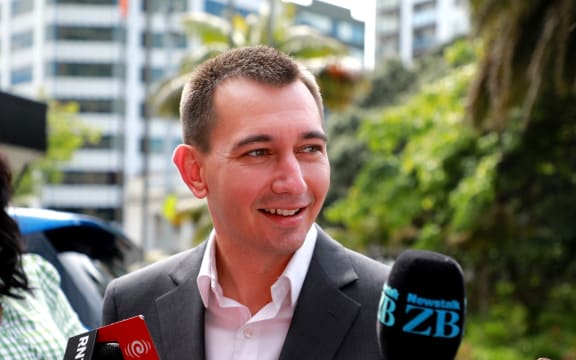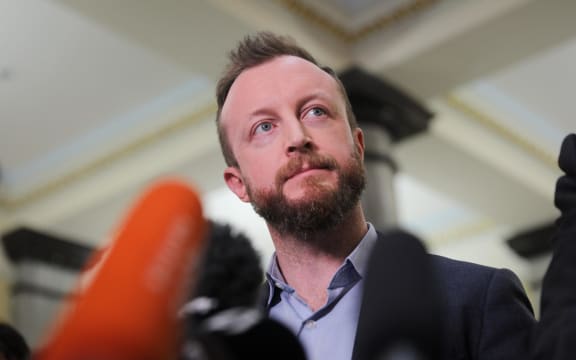
Photo: RNZ
Labour is warning the repeal and replacement of its water services reforms will lead to rates rises across the country.
The government announced on Monday it is set to repeal Labour's Affordable Water Reform - previously known as Three Waters - by 23 February.
In mid-2024 it will introduce a bill to streamline requirements to set up council-controlled organisations (CCOs), allowing councils to band together and form organisations to achieve balance sheet separation. The CCOs could then borrow more than what councils could do individually.
By mid-2025, it will pass legislation to set out the long-term requirements for financial sustainability, as well as regulatory backstop powers.

Simeon Brown Photo: Nick Monro / RNZ
Labour's original plan was to create four mega-entities, which would take on the assets and the debt. It was later expanded to 10.
National campaigned on keeping the assets in councils' hands.
"Rather than a very expensive, mega-entity bureaucratic approach, mandated on local communities, we'll be allowing communities to put forward their plans, and have the tools that they need to deliver that," said local government minister Simeon Brown.
Brown confirmed the government would not underwrite the organisations, and it was now up to councils to set up the CCOs and achieve the balance sheet separation required to borrow more money.
He said while the government would give councils the tools and policy settings, water was a local government responsibility.
"If they set themselves up in the right way, with multiple councils being part of it, they will be able to be balance sheet separated to have that long-term funding and finance arrangements in place. There's a range of options around how they do that, this is about setting the policies, and then they take responsibility for that investment in the long term."

Labour local government spokesperson Kieran McAnulty speaking to reporters in Wellington on 2 October, 2023. Photo: RNZ / Angus Dreaver
Asked about an area like the South Island's West Coast, which needs a lot of money spent on its water infrastructure, wanting to join Canterbury, but the latter possibly being unwilling, Brown said it was a hypothetical at this stage. However, there were "a range of tools" available under the Local Government Act in terms of step-in powers for government.
"We're still working through that particular part of the policy. We will have a regulatory backstop to be able to get in where those councils are unable or unwilling to put forward those plans," he told Morning Report.
He said the government would not be mandating the use of water meters, however, they made sense in cities and large towns because they significantly reduced leakage and there was a user pays approach to water consumption.
"It works in Auckland ...we think it's a sensible approach."
Brown said he was confident the government's plans for water infrastructure would be cheaper to deliver than Labour's.
Labour local government spokesperson Kieran McAnulty said the only outcome was higher rates.
"You can't have direct council control and balance sheet separation, they were going to have to pick one. Now they know that in the future it's going to be councils and mayors that cop it when they increase rates. But actually, when ratepayers look at their bill, and they see an increase, that's because the council had no choice."
McAnulty said larger councils would be less inclined to work with smaller councils, if it was on a voluntary basis.
"Those councils that are at their debt caps, I'm not sure what on earth they're going to do now, because the government has said they won't help them financially.
"And those whose communities can't afford it, they have no alternative but to increase rates. There's going to be significant financial strain hitting ratepayers in a relatively short period of time."
Council reaction
Clutha District mayor Bryan Cadogan had supported Labour's initial plan to move all of the South Island's assets into one entity.
He said councils would need to collaborate to get the assets off their books, either with government support, or by banding together.
"For the entire South Island to join together, you get the efficiency and you get the ability to bring the costs down. Without those efficiencies, nothing else that's being offered is doing anything other than delaying the inevitable and exacerbating the situation."
Cadogan said he did not know of a council that was not facing unprecedented rates rises.
But Manawatu mayor Helen Worboys was delighted the government had listened to councils.
Worboys co-chairs Communities 4 Local Democracy, a group of 30 councils opposed to Labour's reforms.
"The good thing is this has been passed back to councils. We now need to pick that up and seriously come up with how this is going to work for our communities. That's what we asked the previous government for, and this government has given us the opportunity," she said.
A number of councils have already modelled their own CCOs, including a group of Hawke's Bay councils which plan to join up.
Worboys said her council was confident it could go it alone, and had accounted for it in its long-term plan.
"It does stack up for us, however we are also looking at what does a regional model look like, are there economies of scale? So you actually need to do that work to find out what is the best option for your community. There's lots of discussions going on," she said.
Auckland mayor Wayne Brown said the proposal was much in line with what Auckland was asking for.
"The critical thing is to get a replacement in place as soon as possible so we can avoid big water price increases. I'm working constructively with the government on that, and initial discussions are promising," he said in a statement.
Local Government New Zealand said the announcement provided much-needed certainty around timelines.
"Councils have been asking for a locally led solution, and that's exactly what the minister's announced," said president Sam Broughton, who is also mayor of Selwyn.
"It is now up to local leaders to collaborate with other councils in their region to come up with a model that works for individual communities."




